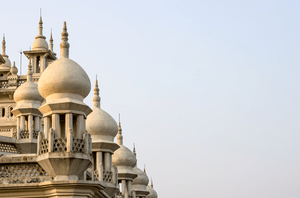The Messenger of Allah ﷺ said, “Whoever fasts Ramadān with īmān and iḥtisāb (hoping for reward), all his previous sins will be forgiven. Whoever performs qiyām in Laylat al-Qadr with īmān and iḥtisāb, all his previous sins will be forgiven. Whoever performs qiyām in the month of Ramaḍān with īmān and iḥtisāb, all his previous sins will be forgiven” (Bukhārī).
Notice the caveat of ‘īmān’ and ‘iḥtisāb’ with these actions of Ramaḍān. When you fast in Ramaḍān, it cannot be because of habit, or because it’s what your family does and is deemed ‘culturally’ the right thing to do. The repetition of īmān and iḥtisāb in the above ḥadīth reminds us that all our good deeds should be an expression of our servitude (ʿubūdiyyah) and obedience to Allah.
Fasting must be accompanied by īmān. It cannot merely be a physical act. It is deeply tied to the state of your heart. Fasting with īmān means to firmly believe that this is a command from Allah: He has made it compulsory, and He will reward you for it. Fasting with iḥtisāb means to fast hoping for reward only from Him; to not feel that you are being forced to fast, or that the fast is too long and feels like a burden. It is simply and purely for Him. A person who fasts with īmān and iḥtisāb is not only content and peaceful, but he is happy that Allah gave him an opportunity to fast.
The Goal of Ramadan: Strengthen Your Iman
The Prophet ﷺ said, “Indeed īmān wears out in the heart just as clothes wear out — so renew your īmān” (Ṭabarānī).
Īmān is like a tree. If it isn’t tended to, it will wither and die. It has to be constantly watered with beneficial knowledge, righteous deeds and the remembrance of Allah. And just as a strong healthy tree must be protected from pests and weeds, we must protect our hearts from sins, desires, and doubts for our īmān to be strong.
The purpose of the acts of worship is to revive the hearts with īmān. The month of Ramaḍān is a perfect opportunity to rejuvenate our īmān and kickstart our journey to Allah. This is because we combine some of the greatest acts of worship such as fasting, ṣalāh, the night prayer, charity, iʿtikāf, dhikr etc. for thirty consecutive days. We also try our best to stay away from sins and we try to have excellent character (akhlāq) in our interactions with people. If someone manages to do all of the above well, it will have a huge impact on reviving his heart, filling it with the light (nūr) of īmān, ready to thrive in its journey to Allah.
Let us make it our goal this Ramaḍān to ensure that everything we do will increase our īmān. The goal should not be to just perform x number of good deeds. Rather than focusing on quantity, let us focus on quality by learning about the inner dimensions of worship. Ibn al-Qayyim (raḥimahullāh) writes, “You may find a person who fasts, prays, does dhikr and recites Qur’ān abundantly, but nothing from his actions reach his heart: no fear, no hope, no love, no conviction in Allah and no happiness with Him.”
Our īmān will only be strengthened if we combine the external physical acts of obedience with the internal ‘actions of the heart’. The actions of the heart include: knowledge of Allah (maʿrifah), sincerity (ikhlāṣ), piety and mindfulness (taqwā), repentance (tawbah), trust in Allah (tawakkul), hope (rajā’), fear (khawf ), gratitude (shukr), patience (ṣabr), love (ḥubb), yearning for Allah (shawq) and certainty (yaqīn).
“The predecessors used to advise that one should perfect his deed and do it well, rather than doing too much of it: for fewer actions performed with perfection are better than abundant actions performed heedlessly and poorly.” – Ibn Rajab (raḥimahullāh)
Taste the Sweetness of Iman & Worship in Ramadan
One of Allah’s greatest blessings upon the servant is that He makes īmān beloved to him, He adorns his heart with the beauty of īmān and He makes him taste its sweetness.
The Prophet ﷺ said, “There are three [qualities] which, if they are found in anyone, shall cause him to experience the sweetness of īmān: that Allah and His Messenger are more beloved to him than everything else; that he loves a person only for Allah’s sake; and that he hates to return to disbelief after Allah had saved him, just as he would hate being thrown into the fire” (Bukhārī).
The sweetness of īmān refers to feeling joy in doing good deeds and in undergoing difficulties for the sake of Allah. The servant worships and undergoes difficulties, forsaking worldly pleasures in pursuit of the eternal pleasures of the hereafter. It is a contentment experienced by those who worship Allah sincerely. Instead of ʿibādah feeling like a burden or a chore, you rush to and relish to worship Allah and serve His creation. Ibn Rajab (raḥimahullāh) writes, “Īmān has a flavour and a sweetness which is tasted by the heart just as the sweetness of food and drink is tasted by the mouth; for indeed īmān is the sustenance of the hearts, just as food and drink are the sustenance of the body.”
Many of us exert ourselves in acts of worship, and yet do not experience this sweetness and happiness. The reason is because we focus solely on the outer physical actions, and we neglect the actions of the heart.
Likewise, if our hearts are sick and diseased due to committing sins and following desires, we cannot enjoy the ‘sweetness of īmān’. When we are sick, we do not enjoy the taste of food. Sometimes we cannot even taste the flavour of the food. If we are feeling nauseous, even the most expensive meal would not entice us to eat.
In order to taste the sweetness of īmān, we have to purify our hearts from its diseases (pride, envy, greed, heedlessness, hypocrisy etc). The Prophet ﷺ said, “Whoever does three things will experience the taste of īmān: …a servant who purifies himself. A man asked, ‘O Messenger of Allah! What does it mean for a person to purify himself?’ He replied, ‘He knows that Allah is with him wherever he may be’” (Bayhaqī).
The Worldly Paradise
Experiencing the sweetness of īmān and acts of worship is life-changing. It is what makes the journey to Allah beautiful. Once you have experienced it, you will know real happiness and forever crave its delight. You will realise that no other blessing can compare, and become protective over it. It is something you can read about extensively, but cannot fully appreciate it until you experience it.
A saint of Allah said, “There are times when I say: if the people of Paradise have anything like this, then how blissful must their lives be!” Another stated, “There are times when the heart bursts in joy (out of the love for Allah).”
After quoting the above, Ibn al-Qayyim (raḥimahullāh) writes, “Glorified is the One who lets His slaves witness His Paradise well before they meet Him, who opens its doors to them in this world of deeds; and who gives them some of its joy, its breeze and its perfume, so that they may seek it and hasten towards it with all their strength.”
Begin Your Journey to Allah
The month of Ramaḍān is a perfect opportunity to experience the joy of īmān and worship: to deeply connect with Allah, to live a life with Him. In our journey to Allah, the initial stages will feel very difficult at times. We have to fight against the nafs, persevere and keep going, until our hearts become attached to Allah. Once our hearts are attached to Allah, the acts of worship will no longer feel difficult and we will begin to enjoy them. Abū Zayd (raḥimahullāh) said, “I forced my nafs (inner self ) to go to Allah whilst it was crying, until I was able to take it to Him whilst it was laughing.”
This Ramaḍān, start your journey to Allah with sincere repentance (tawbah), and revel in the joy of reuniting with your Creator after having been away. This Ramaḍān, feel the joy of hunger when fasting, and give up your desires (which you love) for your Beloved, who you love much more.
This Ramaḍān, relish the sweetness of ṣalāh. Our beloved Prophet ﷺ said, “My utmost joy has been put in ṣalāh” (Nasā’ī). Soothe your heart by conversing and crying to your Lord in the stillness of the night, alone. Make the Qur’ān your best friend, and find immense peace in its recitation as, “There is nothing sweeter to the lover than the words of his beloved, for it is the joy of their hearts and their utmost desire” (Ibn Rajab (raḥimahullāh)). This Ramaḍān, serve your family, neighbours and the creation of Allah selflessly and happily. Overcome your ego and emulate the sublime character of Allah’s beloved, Muḥammad ﷺ. Feel greater joy in giving charity and helping others than the recipients of the charity themselves.
“The one who is sincere for Allah will taste the sweetness of servitude to Allah, to the extent that it will prevent him from servitude to anyone else. This is because there is nothing sweeter nor more joyful or blissful than the sweetness of īmān, which consists of servitude to Allah, loving Him and being sincere in the religion for Him. This requires the heart to journey to Allah: to turn to Him in constant repentance, to love Him and to be in constant awe of Him.” – Ibn Taymiyyah (raḥimahullāh)
Let us always ask Allah with the words of His Beloved ﷺ:
اَللّٰهُمَّ زَيِّنَّا بِزِيْنَةِ الْإِيْمَانِ ، وَاجْعَلْنَا هُدَاةً مُّهْتَدِيْنَ
O Allah, adorn us with the beauty of īmān and make us those who guide others and are guided themselves.
May Allah al-Mu’min (The Giver of īmān and safety) make our īmān firm in our hearts and may He make us die on īmān. May He grant us the bliss of īmān and worship in this world, and the bliss of His company in Paradise.






